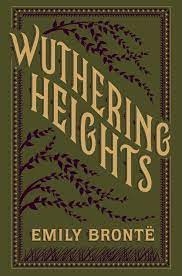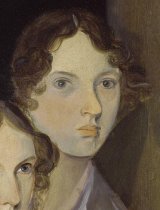Wuthering Heights Page #12
Wuthering Heights is an 1847 novel by Emily Brontë, initially published under the pseudonym Ellis Bell. It concerns two families of the landed gentry living on the West Yorkshire moors, the Earnshaws and the Lintons, and their turbulent relationships with Earnshaw's adopted son, Heathcliff.
“I shall bid father good-night first,” said Catherine, putting her arms round his neck, before we could hinder her. The poor thing discovered her loss directly—she screamed out—“Oh, he’s dead, Heathcliff! he’s dead!” And they both set up a heart-breaking cry. I joined my wail to theirs, loud and bitter; but Joseph asked what we could be thinking of to roar in that way over a saint in heaven. He told me to put on my cloak and run to Gimmerton for the doctor and the parson. I could not guess the use that either would be of, then. However, I went, through wind and rain, and brought one, the doctor, back with me; the other said he would come in the morning. Leaving Joseph to explain matters, I ran to the children’s room: their door was ajar, I saw they had never lain down, though it was past midnight; but they were calmer, and did not need me to console them. The little souls were comforting each other with better thoughts than I could have hit on: no parson in the world ever pictured heaven so beautifully as they did, in their innocent talk; and, while I sobbed and listened, I could not help wishing we were all there safe together. CHAPTER VI Mr. Hindley came home to the funeral; and—a thing that amazed us, and set the neighbours gossiping right and left—he brought a wife with him. What she was, and where she was born, he never informed us: probably, she had neither money nor name to recommend her, or he would scarcely have kept the union from his father. She was not one that would have disturbed the house much on her own account. Every object she saw, the moment she crossed the threshold, appeared to delight her; and every circumstance that took place about her: except the preparing for the burial, and the presence of the mourners. I thought she was half silly, from her behaviour while that went on: she ran into her chamber, and made me come with her, though I should have been dressing the children: and there she sat shivering and clasping her hands, and asking repeatedly—“Are they gone yet?” Then she began describing with hysterical emotion the effect it produced on her to see black; and started, and trembled, and, at last, fell a-weeping—and when I asked what was the matter, answered, she didn’t know; but she felt so afraid of dying! I imagined her as little likely to die as myself. She was rather thin, but young, and fresh-complexioned, and her eyes sparkled as bright as diamonds. I did remark, to be sure, that mounting the stairs made her breathe very quick; that the least sudden noise set her all in a quiver, and that she coughed troublesomely sometimes: but I knew nothing of what these symptoms portended, and had no impulse to sympathise with her. We don’t in general take to foreigners here, Mr. Lockwood, unless they take to us first. Young Earnshaw was altered considerably in the three years of his absence. He had grown sparer, and lost his colour, and spoke and dressed quite differently; and, on the very day of his return, he told Joseph and me we must thenceforth quarter ourselves in the back-kitchen, and leave the house for him. Indeed, he would have carpeted and papered a small spare room for a parlour; but his wife expressed such pleasure at the white floor and huge glowing fireplace, at the pewter dishes and delf-case, and dog-kennel, and the wide space there was to move about in where they usually sat, that he thought it unnecessary to her comfort, and so dropped the intention. She expressed pleasure, too, at finding a sister among her new acquaintance; and she prattled to Catherine, and kissed her, and ran about with her, and gave her quantities of presents, at the beginning. Her affection tired very soon, however, and when she grew peevish, Hindley became tyrannical. A few words from her, evincing a dislike to Heathcliff, were enough to rouse in him all his old hatred of the boy. He drove him from their company to the servants, deprived him of the instructions of the curate, and insisted that he should labour out of doors instead; compelling him to do so as hard as any other lad on the farm. Heathcliff bore his degradation pretty well at first, because Cathy taught him what she learnt, and worked or played with him in the fields. They both promised fair to grow up as rude as savages; the young master being entirely negligent how they behaved, and what they did, so they kept clear of him. He would not even have seen after their going to church on Sundays, only Joseph and the curate reprimanded his carelessness when they absented themselves; and that reminded him to order Heathcliff a flogging, and Catherine a fast from dinner or supper. But it was one of their chief amusements to run away to the moors in the morning and remain there all day, and the after punishment grew a mere thing to laugh at. The curate might set as many chapters as he pleased for Catherine to get by heart, and Joseph might thrash Heathcliff till his arm ached; they forgot everything the minute they were together again: at least the minute they had contrived some naughty plan of revenge; and many a time I’ve cried to myself to watch them growing more reckless daily, and I not daring to speak a syllable, for fear of losing the small power I still retained over the unfriended creatures. One Sunday evening, it chanced that they were banished from the sitting-room, for making a noise, or a light offence of the kind; and when I went to call them to supper, I could discover them nowhere. We searched the house, above and below, and the yard and stables; they were invisible: and, at last, Hindley in a passion told us to bolt the doors, and swore nobody should let them in that night. The household went to bed; and I, too anxious to lie down, opened my lattice and put my head out to hearken, though it rained: determined to admit them in spite of the prohibition, should they return. In a while, I distinguished steps coming up the road, and the light of a lantern glimmered through the gate. I threw a shawl over my head and ran to prevent them from waking Mr. Earnshaw by knocking. There was Heathcliff, by himself: it gave me a start to see him alone.
Translation
Translate and read this book in other languages:
Select another language:
- - Select -
- 简体中文 (Chinese - Simplified)
- 繁體中文 (Chinese - Traditional)
- Español (Spanish)
- Esperanto (Esperanto)
- 日本語 (Japanese)
- Português (Portuguese)
- Deutsch (German)
- العربية (Arabic)
- Français (French)
- Русский (Russian)
- ಕನ್ನಡ (Kannada)
- 한국어 (Korean)
- עברית (Hebrew)
- Gaeilge (Irish)
- Українська (Ukrainian)
- اردو (Urdu)
- Magyar (Hungarian)
- मानक हिन्दी (Hindi)
- Indonesia (Indonesian)
- Italiano (Italian)
- தமிழ் (Tamil)
- Türkçe (Turkish)
- తెలుగు (Telugu)
- ภาษาไทย (Thai)
- Tiếng Việt (Vietnamese)
- Čeština (Czech)
- Polski (Polish)
- Bahasa Indonesia (Indonesian)
- Românește (Romanian)
- Nederlands (Dutch)
- Ελληνικά (Greek)
- Latinum (Latin)
- Svenska (Swedish)
- Dansk (Danish)
- Suomi (Finnish)
- فارسی (Persian)
- ייִדיש (Yiddish)
- հայերեն (Armenian)
- Norsk (Norwegian)
- English (English)
Citation
Use the citation below to add this book to your bibliography:
Style:MLAChicagoAPA
"Wuthering Heights Books." Literature.com. STANDS4 LLC, 2025. Web. 15 Mar. 2025. <https://www.literature.com/book/wuthering_heights_1627>.








Discuss this Wuthering Heights book with the community:
Report Comment
We're doing our best to make sure our content is useful, accurate and safe.
If by any chance you spot an inappropriate comment while navigating through our website please use this form to let us know, and we'll take care of it shortly.
Attachment
You need to be logged in to favorite.
Log In